Oct 2018
Scapegoating and killing seals will not save orcas
Oct/31/18 03:24 PM
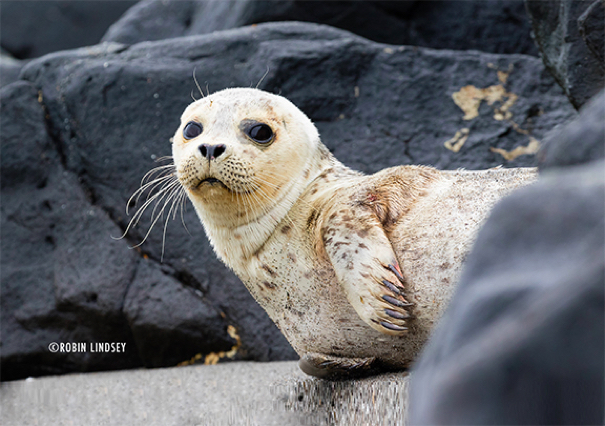
Resident orcas choose to selectively eat chinook salmon, which makes up 80% of their diet. Yes, harbor seals do indeed eat chinook. However, seals are opportunistic feeders and will consume whatever is available to them in their struggle to survive - this includes shrimp, squid, and a wide variety of fish. Puget Sound and surrounding inland waters provide their one and only food source. Seals are certainly not the sole reason the chinook populations are vanishing. Scientists admit that killing seals very likely will have little or no impact on increasing chinook stock. With a reduced presence of seals, there could be unintended consequences for other fish species, putting predator/prey relationships and nature further out of balance.
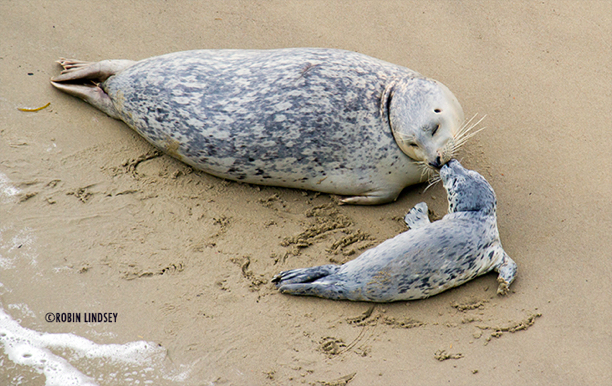
The Transient (mammal-eating) orcas, known as Bigg’s Killer Whales, have been doing their own natural cull of seals and sea lions the past several years, frequently entering and lingering in Puget Sound to feast on them. These Transients have already reduced the numbers of harbor seals in Puget Sound.
Much has also been made of, and rightly so, the devastating impact of human-caused pollution on the beloved Southern Resident orcas. However, they are not the only marine mammals who have been poisoned. Harbor seals are year-round residents and do not migrate out of our local waters. They are considered a sentinel species and, just like the resident orcas, suffer the same devastating health effects of pollution, including improperly disposed pharmaceuticals, flame retardants and other toxic chemicals that bleed into our waters from storm runoff and plastic ocean trash that seeps invisible, deadly contaminants. These toxins enter the food chain and are stored in the blubber of both orcas and harbor seals, who pass on these pollutants to their offspring thru mothers’ milk. Causing immune disorders, deformities and deaths, this tragic scenario is not just reserved for the seals and orcas. It affects the very salmon the orcas depend on as well. (Read more about the dangers of pollution here)
It is unjust to blame and punish harbor seals for humans’ bad behavior. We have laced our waters with toxins, destroyed marine habitat and have historically overfished resources - all due to human short-sightedness and, many would say, greed. Some argue that both recreational boaters and the exploding whale watch industry, dogged in their pursuit to see the Residents, are literally loving them to death and interfering with their ability to effectively forage for depleted fish stocks. While most operators are respectful, due to sheer numbers, something needs to be done.
What could make a difference? Decreasing runoff and pollution, regulating fishing, restoring salmon habitat, increasing restrictions on whale watching (including "no go” or "slow go” zones) and breaching the four lower dams along the Snake River waterway are sane and humane ways to help the chinook and Southern Residents survive. Harbor seals (and California sea lions) must not be falsely scapegoated and culled.
Humans need to accept responsibility for the repercussions of our actions. We must make sacrifices to save species, not sacrifice innocent ones.
SPEAK OUT FOR THE SEALS
Please contact the Governor’s Task Force HERE.
Let the committee members know that you are emphatically opposed to killing seals and/or preventing them from their critical, natural behavior to be able to rest and give birth onshore. Your comment can truly save seals’ lives.
Volunteers invested in protecting harbor seal Harlequin
Oct/29/18 09:55 AM
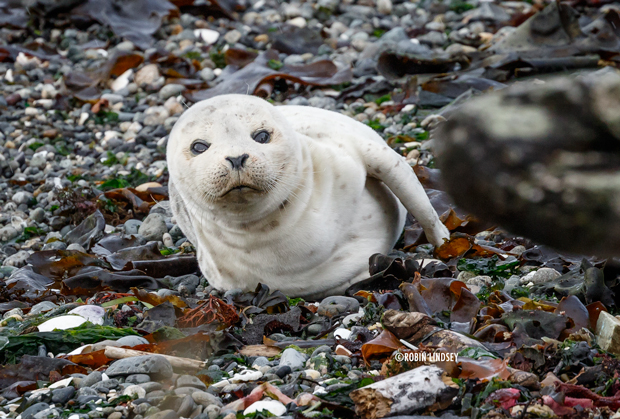
After three successive days on the same small neighborhood beach, it appears that perhaps weaner seal Harlequin has moved on - or has found an alternative resting site nearby, but out of view of the public. He has not been sighted since Sunday evening. We are hoping the little male has found safe haven on private beach as he had in the first part of the week.
Early Sunday morning, following yet another night of winds and heavy rains, First Responder Dana grabbed her carafe of tea and ran out to do a check of the cove, expecting Harlequin to make a return trip to the quiet spot where he had rested two days straight. Sure enough, the small seal didn’t disappoint and flopped ashore just as the receding tide revealed a bit of beach. Harlequin immediately zonked out. Volunteer Scheduler Jimi began lining up volunteers for the day. They educated passersby as the seal dozed peacefully for hours, soaking up some welcome sun. Around midday, he stirred and observed his surroundings. Sensing no threat, he crashed out for the remainder of the afternoon.
Many people asked, “Where’s Mom?” Volunteers explained that Harlequin, estimated to be 3-5 months old, was entirely on his own. After only about a month of nursing, it is often a struggle for these young weaners to make the transition to foraging. This time of year, the majority of all weaned harbor seal pups are too thin. With no thick layer of blubber to keep them warm and provide energy, storms such as the ones we have experienced this week can exhaust them. Undisturbed rest is absolutely critical to their survival, enabling weaners to recharge and preserve their strength so they can forage for longer periods.
Late in the afternoon, the winds increased and a heavy rain began to fall. An unfazed Harlequin returned to the black waters of Puget Sound sometime around 8pm and Dana removed the tape and signage from the cove. Thanks to the many volunteers who endured some brisk, wet weather to give Harlequin safe haven onshore.
Checks of the beach throughout Monday showed no sign of Harlequin. We hope he is safe and fattening up.
Seal Sitters does ask homeowners to please call our dedicated hotline @ 206-905-7325 (SEAL) if you have a seal or sea lion using your beach. It enables us to keep tabs on the population and is especially helpful if we are trying to locate an injured or ill animal.
When it rains, it pours seals - two on a drippy day
Oct/27/18 10:42 AM
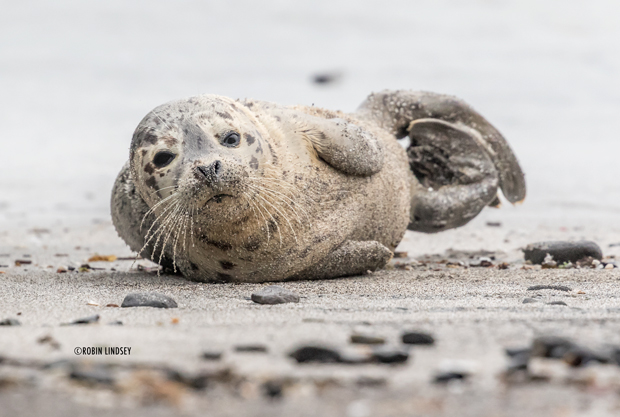
NEW WEANER NINJA SPENDS DAY AT BOAT RAMP
After an extensive drought in responses to live harbor seal pups, Seal Sitters finally got the chance to provide some protection for two seals seeking rest along Puget Sound shoreline - on what turned out to be a very wet day.
Early Saturday morning, SS volunteer John S was taking his daily walk along Harbor Avenue. As usual, he checked the locations that seal pups are known to come ashore. There were none at Don Armeni Boat Launch. He continued his walk, but within minutes received a call from a friend that a pup had just come ashore there.
John quickly returned to the ramp and kept people away until Co-Investigator Lynn arrived to put up barricades and string yellow tape. The day's First Responders Jay and Dori were notified and Scheduler Kelsey began making calls.
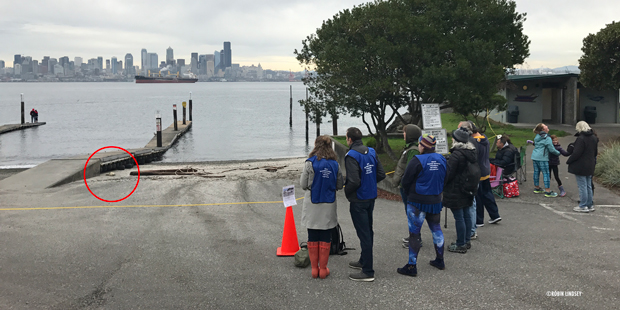
The new weaner, nicknamed Ninja, spent a long day snoozing on the ramp, guarded by a steady stream of Seal Sitters volunteers (photo above). Luckily, it was a dreary day and not much boating activity at the popular ramp. As is typical of weaners in late Fall, the seal was too thin. Finally, just as darkness began to fall and in the pouring rain, he returned to Elliott Bay - hopefully, to fatten up on squid and small fish. Thanks to everyone who kept Ninja safe!
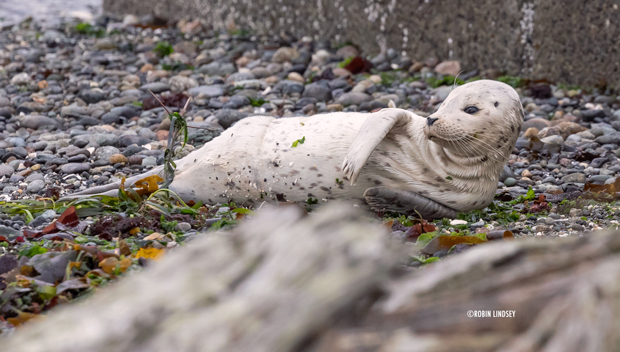
HARLEQUIN BACK FOR SECOND DAY IN A ROW AT NEIGHBORHOOD BEACH
Around 10am, SS Hotline Operator Larry received a call that a seal was on a small public access beach on Beach Drive (photo above). While First Responders Jay and Dori headed down from Don Armeni, off-duty Responder Dana offered to tape off the second seal since she lived just a few properties from the park.
Co-Investigator Robin confirmed that the thin weaner was indeed Harlequin, returning for a second day at the neighborhood beach.
Scheduler Kelsey had her hands full trying to shuffle and line up enough volunteers for two locations for what turned out to be a very long day. Thanks to numerous Seal Sitters volunteers who worked in shifts, a very alert Harlequin was kept safe until dark, when he finally returned to the Sound. First Responders and Volunteers, drenched and cold, were thankful to escape the downpour and be able to go home and warm up.
Thanks to everyone who enabled Harlequin to get some much-needed rest onshore yesterday, after likely spending a stormy Friday night in the waters of Puget Sound.
Seal and a sea lion onshore makes for a busy day
Oct/26/18 02:21 PM
Seal Sitters hotline starting ringing this morning with multiple reports of a seal or possible sea lion at Alki Beach. Hotline Operator Susan immediately notified First Responder Jimi who met Co-Investigators Lynn and Robin at the site, but the animal was gone. A Seattle Parks gardener had done her best to keep people away. A cellphone photo texted to Lynn verified that it was indeed a California sea lion that had come ashore twice, but did not stay long and seemed to have some difficulty with mobility.
It is not typical behavior for an adult California sea lion to be on the beach in West Seattle and usually means the animal has an illness or injury. Please immediately call Seal Sitters Hotline @ 206-905-7325 (SEAL) if you see a sea lion onshore.
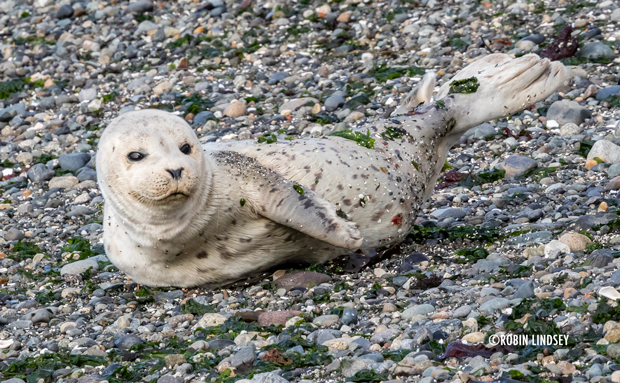 The hotline rang with another call: there was a seal at a small pocket beach along Beach Drive. First Responder Jimi rushed to check on the seal. Robin was already there and identified the small, fluffy harbor seal, snoozing on the pebbled beach, as Harlequin. While the responders were taping off access with informational signage and tape, Scheduler Colette lined up volunteers to talk to passersby on the busy sidewalk above the beach.
The hotline rang with another call: there was a seal at a small pocket beach along Beach Drive. First Responder Jimi rushed to check on the seal. Robin was already there and identified the small, fluffy harbor seal, snoozing on the pebbled beach, as Harlequin. While the responders were taping off access with informational signage and tape, Scheduler Colette lined up volunteers to talk to passersby on the busy sidewalk above the beach.
There was some concern that a bloody umbilicus might be infected. However, there was no swelling or apparent signs of infection and appears that a navel scab (seen the day before) had scraped off as Harlequin came ashore. Harlequin returned to the water around 2pm.
It is not typical behavior for an adult California sea lion to be on the beach in West Seattle and usually means the animal has an illness or injury. Please immediately call Seal Sitters Hotline @ 206-905-7325 (SEAL) if you see a sea lion onshore.
 The hotline rang with another call: there was a seal at a small pocket beach along Beach Drive. First Responder Jimi rushed to check on the seal. Robin was already there and identified the small, fluffy harbor seal, snoozing on the pebbled beach, as Harlequin. While the responders were taping off access with informational signage and tape, Scheduler Colette lined up volunteers to talk to passersby on the busy sidewalk above the beach.
The hotline rang with another call: there was a seal at a small pocket beach along Beach Drive. First Responder Jimi rushed to check on the seal. Robin was already there and identified the small, fluffy harbor seal, snoozing on the pebbled beach, as Harlequin. While the responders were taping off access with informational signage and tape, Scheduler Colette lined up volunteers to talk to passersby on the busy sidewalk above the beach. There was some concern that a bloody umbilicus might be infected. However, there was no swelling or apparent signs of infection and appears that a navel scab (seen the day before) had scraped off as Harlequin came ashore. Harlequin returned to the water around 2pm.
At last, a little seal to protect onshore
Oct/25/18 02:50 PM
First Responder Victoria was getting pretty discouraged the past few weeks. It seemed that lately, on her weekly day of duty for Seal Sitters, all she had responded to were dead and often quite decomposed young harbor seals. It had been over a month since Seal Sitters had looked after a live seal. Imagine her surprise and delight when around 10am on Monday she received a call from Hotline Operator Cheri and subsequently taped off a small bit of public access to protect a small seal at Emma Schmitz Overlook.
On this very foggy morning, Scheduler Colette lined up several volunteers (Jay, Tim and Ashley), who watched over Harlequin, named after the beautiful harlequin ducks observed in the water nearby. As the tide started to rise, the beach began to disappear. The thin seal returned to the Sound around 1pm and vanished in the fog. Harlequin was not sighted the following day.
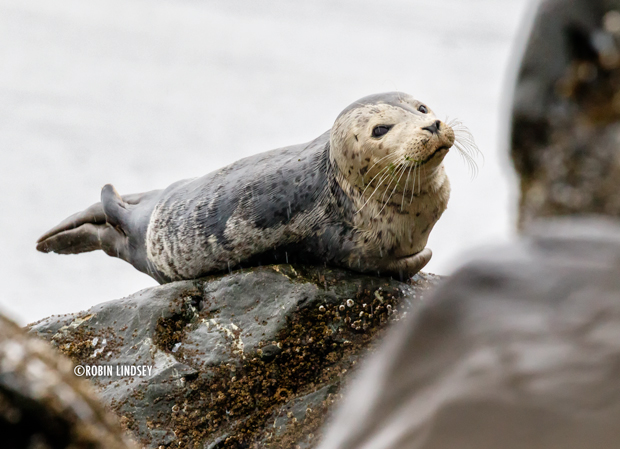 A waterfront homeowner called on Wednesday to report a seal, perched on a large rock along the seawall of her property (photo above). Co-Investigator Lynn identified him as Harlequin. Since there was no minus tide and little risk of beachcombers and dogs, he was deemed relatively safe, so no volunteers were necessary. The young seal was back on the homeowner’s beach Thursday morning, too - once again staying until the incoming tide reached his favorite rock, forcing him to return to Puget Sound mid-afternoon. We were relieved he had found a tucked-away, private spot to rest.
A waterfront homeowner called on Wednesday to report a seal, perched on a large rock along the seawall of her property (photo above). Co-Investigator Lynn identified him as Harlequin. Since there was no minus tide and little risk of beachcombers and dogs, he was deemed relatively safe, so no volunteers were necessary. The young seal was back on the homeowner’s beach Thursday morning, too - once again staying until the incoming tide reached his favorite rock, forcing him to return to Puget Sound mid-afternoon. We were relieved he had found a tucked-away, private spot to rest.
On this very foggy morning, Scheduler Colette lined up several volunteers (Jay, Tim and Ashley), who watched over Harlequin, named after the beautiful harlequin ducks observed in the water nearby. As the tide started to rise, the beach began to disappear. The thin seal returned to the Sound around 1pm and vanished in the fog. Harlequin was not sighted the following day.
 A waterfront homeowner called on Wednesday to report a seal, perched on a large rock along the seawall of her property (photo above). Co-Investigator Lynn identified him as Harlequin. Since there was no minus tide and little risk of beachcombers and dogs, he was deemed relatively safe, so no volunteers were necessary. The young seal was back on the homeowner’s beach Thursday morning, too - once again staying until the incoming tide reached his favorite rock, forcing him to return to Puget Sound mid-afternoon. We were relieved he had found a tucked-away, private spot to rest.
A waterfront homeowner called on Wednesday to report a seal, perched on a large rock along the seawall of her property (photo above). Co-Investigator Lynn identified him as Harlequin. Since there was no minus tide and little risk of beachcombers and dogs, he was deemed relatively safe, so no volunteers were necessary. The young seal was back on the homeowner’s beach Thursday morning, too - once again staying until the incoming tide reached his favorite rock, forcing him to return to Puget Sound mid-afternoon. We were relieved he had found a tucked-away, private spot to rest.






